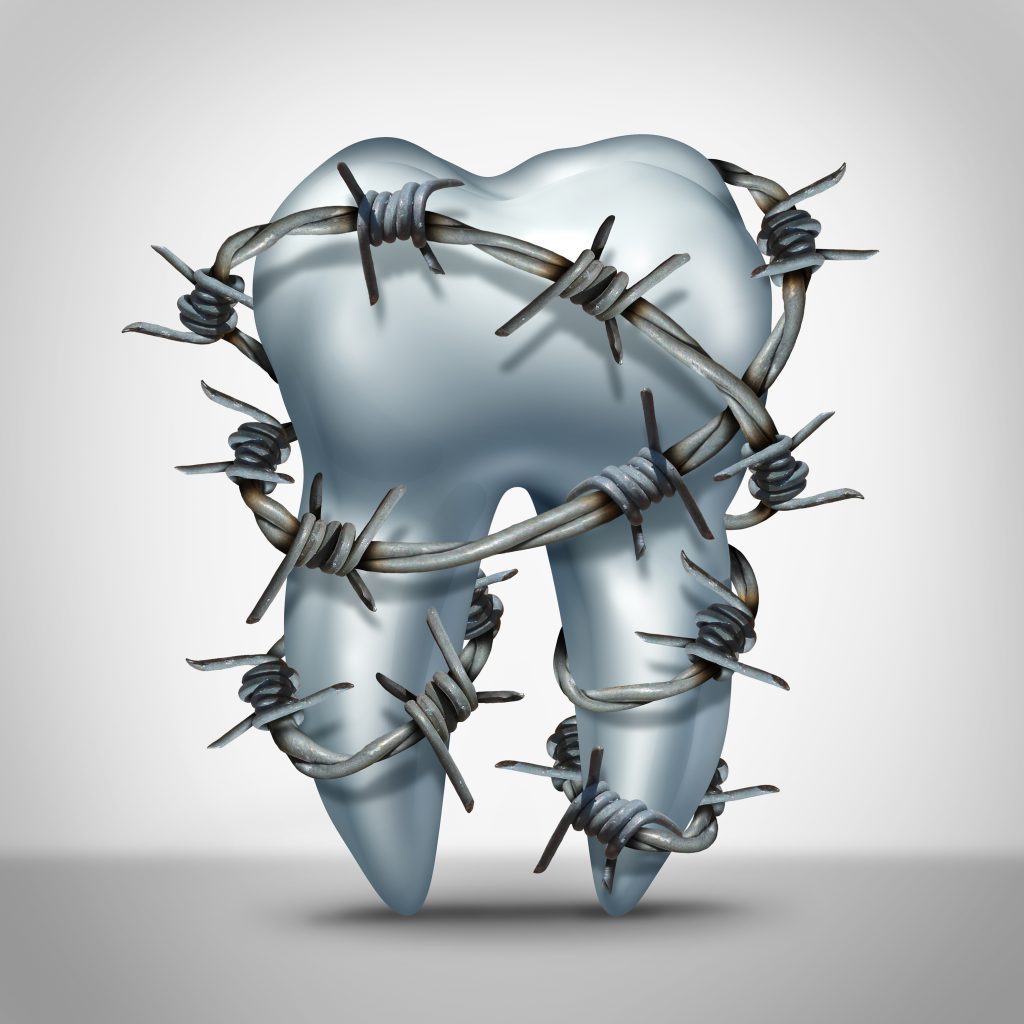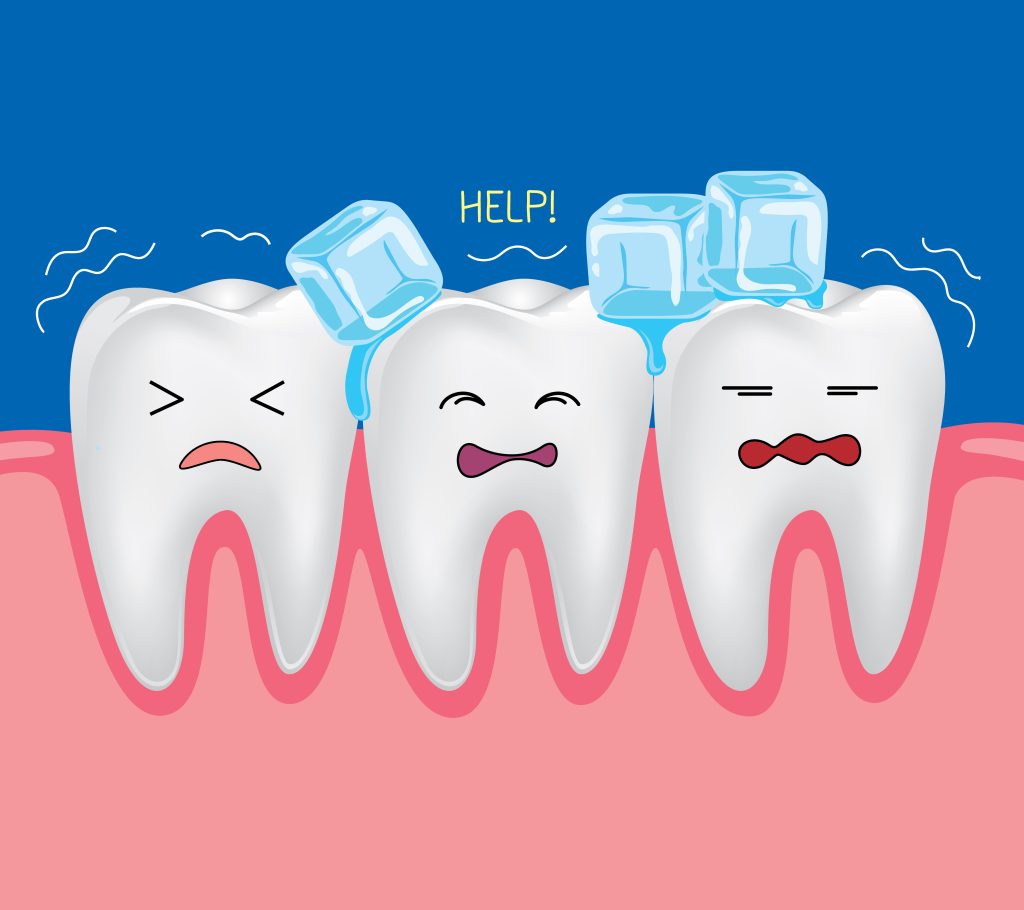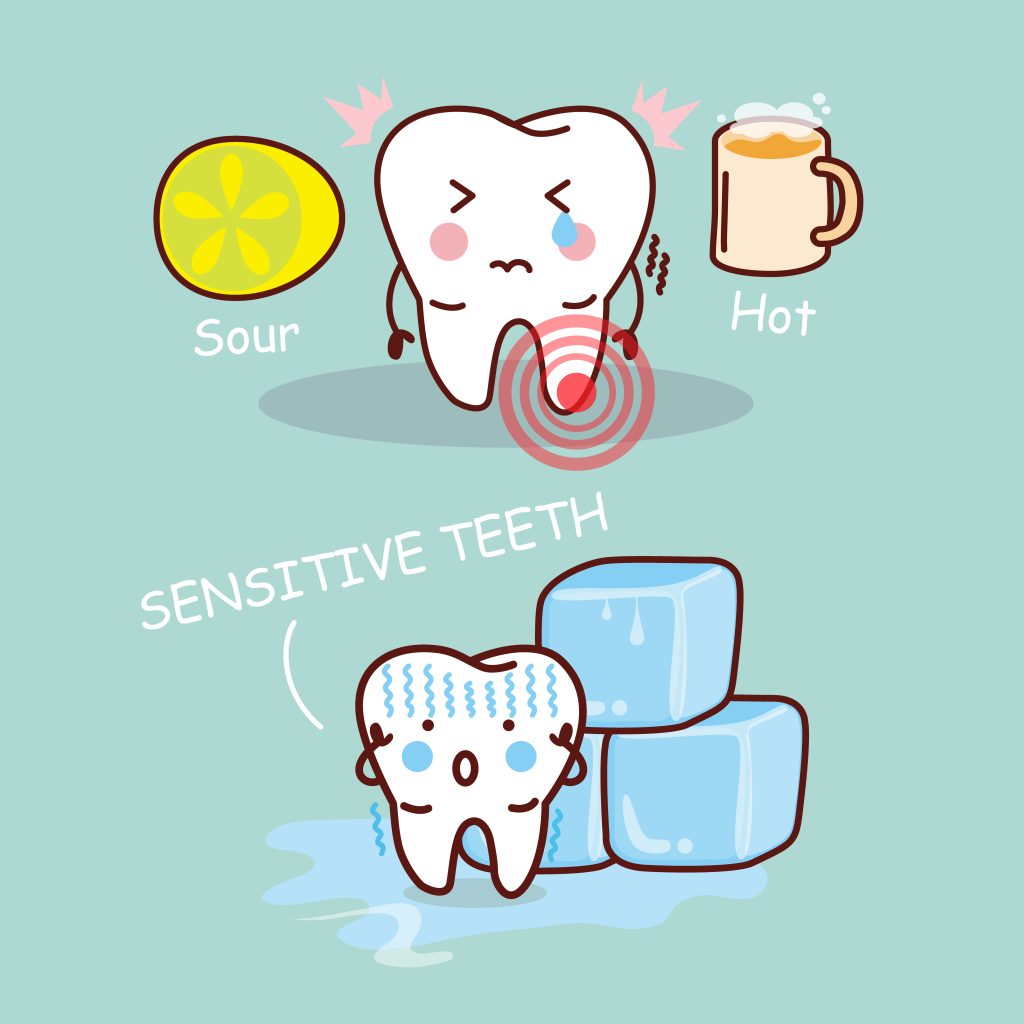Millions of people have sensitive teeth. Causes include:
- Eating too much sugar.
- Drinking or eating acidic drinks or foods.
- Tooth decay.
- Grinding at night, and more.
Let’s say you have sensitive teeth or gum tissue. In that case, you can do a few things to help ease the pain. This article will discuss what causes dentin hypersensitivity and what you can do to feel better.
What Causes Tooth Sensitivity?
There are a few different things that can make your teeth hurt. A poor oral health routine can cause this, or it can be a sign of a bigger health problem. Some of the most frequent reasons are:
Eating Too Much Sugar
Sugar is one of the primary sources of sensitive teeth. When you eat or drink something sweet, the bacteria in your mouth use the sugar to make acid. This acid can wear down your enamel, making you more sensitive to hot, cold, sweet, and sour foods.
Drinking Acidic Beverages
Acidic drinks are another common thing that can cause sensitivity. Some drinks like soda, coffee, and tea can worsen existing sensitivity. Stay away from sodas with a lot of sugar, as they can do twice as much harm. If you have to drink them, use a straw, so they don’t touch your teeth, and you might consider brushing after.
Tooth Rot
Tooth rot is another common cause of sensitivity. When your teeth get cavities, the nerves inside them can become more visible.
Receding Gums
Receding gums can also cause tooth sensitivity. When your gums shrink, the root, the bony support at the base of a tooth, shows. As a result, your tooth’s root is much more sensitive than the rest of it. This can cause pain in the root surfaces.
Tooth Grinding
Nighttime grinding can cause sensitivity. Grinding erodes enamel and exposes tooth roots. This makes teeth sensitive to hot, cold, and sweet foods and drinks.
Underlying Health Conditions
Health issues can also cause tooth sensitivity. Gum disease leads to exposed tooth roots and increased sensitivity. Acid reflux causes tooth sensitivity. Stomach acid can erode tooth enamel, causing tooth pain.
Loss of Tooth Enamel
Another common cause of tooth discomfort is the wearing down of the enamel on the tooth surface. This can be due to brushing too hard, drinking acidic beverages, or even just aging. When the enamel wears down, it exposes the dentin, the sensitive layer under the enamel. This can lead to reactions to things that come in contact with the dentin.
How to Find Relief from Tooth Sensitivity
If you’re suffering from tooth sensitivity, you can do a few things to find relief. The American Dental Association, Mayo Clinic, and Oral Health Foundation recommend the following tips:
Practice Good Oral Hygiene: You can also reduce tooth sensitivity by practicing good oral hygiene. Be sure you brush twice daily and use over-the-counter mouthwashes regularly. It would be best if you also flossed daily to remove food and plaque between your teeth.
Use a Soft-Bristled Toothbrush: Brushing with a hard-bristled toothbrush can wear away at your tooth enamel. This can lead to increased sensitivity and pain. Instead, use a soft-bristled toothbrush so you don’t damage the protective layer.
Use Desensitizing Toothpaste: Many different fluoride brands of fluoride toothpaste are specifically designed to prevent sensitive teeth. These kinds of toothpaste work by filling in the exposed microscopic channels in your teeth. This can help reduce the pain and sensitivity you’re feeling when you eat acidic foods or when breathing cold air hits your teeth.
Try Fluoride Treatments: Fluoride gel treatments can help to reduce tooth sensitivity by strengthening the enamel on your teeth. You can find fluoride treatments at your local drugstore or consult your dental practitioner about in-office treatments.
Avoid Acidic Foods: It’s crucial to avoid acidic foods and drinks. These include soda, coffee, tea, citrus fruits, tomato sauce, and wine. If you can’t avoid them altogether, be sure to brush your teeth an hour after consuming them.
Sweet or sticky foods can also cause tooth sensitivity. These include candy, gum, and fruit snacks. If you eat these kinds of foods, be sure to brush your teeth afterward!
Don’t Prolong Your Dental Visits: See your dentist for cracked teeth, discomfort, or if you are showing signs of gum disease. A cracked tooth will inevitably lead to tooth rot and increased sensitivity to hot and cold temperatures. If you have cracked one or more of your teeth, call your dental office immediately so they can schedule an appointment to fix it. Additionally, if you are showing signs of gum disease, such as bleeding gums or swollen gums, see your dentist to have it treated.
Remember that after a dental visit, the area where the work was done may be extra sensitive for a few weeks. This is normal. If the sensitivity persists, call your dental office.

Tooth pain dental toothache concept as a human molar symbol with sharp barbed wire as a dentist metaphor for sensitive teeth or infection caused by poor oral hygeine and tooth decay
When It Comes to Sensitive Teeth and Gum Tissue, How Can a Dentist Help?
If you can’t control your sensitive teeth at home, ask your dentist about other treatments for sensitive areas besides brushing with special toothpaste and avoiding foods.
Your dentist may suggest:
Flouride: The most common treatment is a fluoride varnish or gel. A fluoride treatment can help reduce the pain you feel when you eat or drink hot or cold beverages by strengthening the tooth enamel.
Sealant: If you have sensitive teeth, your dentist might also recommend getting a protective covering sealant. Sealants are a thin coating of plastic applied to the chewing surfaces of your back teeth. This can help to protect you from cavities and sensitivity.
Mouth Guard: If you suffer from bruxism (teeth grinding), your dentist might recommend using a mouth guard at night. This can help to protect your teeth from the damage caused by grinding and can also help to reduce discomfort.
Root Canal: In some cases, a root canal might be necessary to overcome tooth rot that has caused increased sensitivity. Root canal therapy is when the dentist removes the damaged tissue inside the tooth and then fills the middle layer of the tooth root with a soft material.
Crown: If you have a cracked tooth, your dentist might recommend getting a crown. A crown is a type of dental restoration that covers the entire tooth, all the way to the gum line. This can help to protect the tooth from further damage and reduce discomfort.
Surgical Gum Graft: If you have sensitive gums, your dentist might recommend getting a surgical gum graft. This is a procedure in which the dentist takes tissue from another area of your mouth and grafts it over the exposed root surfaces at the gum line. This can help to reduce sensitivity and protect your gums from further damage.
Ask Your Dentist How to Reduce Sensitivity
If you are experiencing tooth sensitivity, the first step is to talk to your dentist about a treatment plan to reduce it. They can help you find the best way to take care of your teeth and gums to minimize the discomfort you are feeling.
Other treatment plan options might be recommended by your dentist, depending on the severity of your tooth sensitivity.
Call Us Today to Schedule an Appointment
At Patient Empowered Dentistry, we are committed to helping our patients find the best way to care for their teeth and gums. Whether your teeth hurt when the air hits them in cold weather, you have issues with cold drinks due to cold sensitivity, or you have another sensitivity that makes your teeth hurt, we offer various services that can help you reduce discomfort, including fluoride treatments and sealants. We also offer cosmetic dentistry, crowns, and root canals, for patients who need more extensive dental work.
If you are concerned about sensitive teeth, contact us today to schedule an appointment. We will work with you to find the best way to reduce the sensitivity and improve your oral health.



